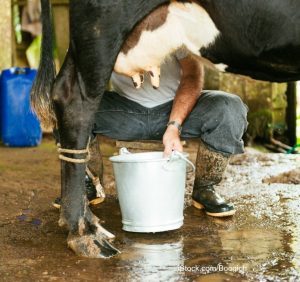A Campylobacter outbreak associated with raw milk produced on a farm in Cambridge, MN is the fourth Campylobacter raw milk outbreak in four months. The outbreak, which has sickened at least six people, prompted officials to temporarily halt on-farm sales of raw milk while they investigate and issue a statewide consumer advisory.
 Campylobacter is a bacteria that is transferred via the fecal-oral route, meaning those who develop Campylobacter infections have ingested microscopic amounts of animal feces. Pasteurization kills bacteria that cause disease, but raw milk is not pasteurized.
Campylobacter is a bacteria that is transferred via the fecal-oral route, meaning those who develop Campylobacter infections have ingested microscopic amounts of animal feces. Pasteurization kills bacteria that cause disease, but raw milk is not pasteurized.
Symptoms of a Campylobacter infection, called campylobacteriosis, include abdominal cramping, vomiting and diarrhea. These infections can pose serious risk for some people, especially young children, seniors, pregnant women and others with compromised immune systems. In some cases, long-term complications can develop including reactive arthritis, which causes painful swelling in the joints and Guillain-Barre Syndrome, which causes paralysis.
Although interstate sales of raw milk have been banned since 1987, state laws govern the sale or acquisition of raw milk within each state. In Minnesota, the retail sale of raw milk is illegal, but consumers may buy raw milk on the farm where it was produced. All six people who became ill reported drinking raw milk from the farm prior to onset of illness. Lab tests have been completed on three patients so far, all of them were sickened by the same strain of Campylobacter.
In May, raw milk from the Family Cow dairy in Pennsylvania, where raw milk is legal, was the source a Campylobacter outbreak that sickened at least five people. This after the diary implemented on-site testing after it was linked to a 2012 Campylobacter outbreak that sickened 80 people in four states.
In Alaska, the retail sale of raw milk is illegal unless the milk is consumed by the cow’s owner, so raw milk enthusiasts there form cow or goat shares to acquire raw milk. Members of animal-share programs are considered owners of animals that are tended by a farmer. One of these cow-share programs on the Kenai Peninsula was the source of a May Campylobacter outbreak that has sickened at least five people and a March Campylobacter outbreak that sickened 31, leaving four of them with reactive arthritis.
In addition to the four Campylobacter outbreaks, there was a May Salmonella outbreak in Minnesota linked to soft cheese made form raw milk that sickened 25 people. And a recall for raw milk earlier this month by Pure Eire Dairy in Othello, Washington for possible E. coli contamination.




